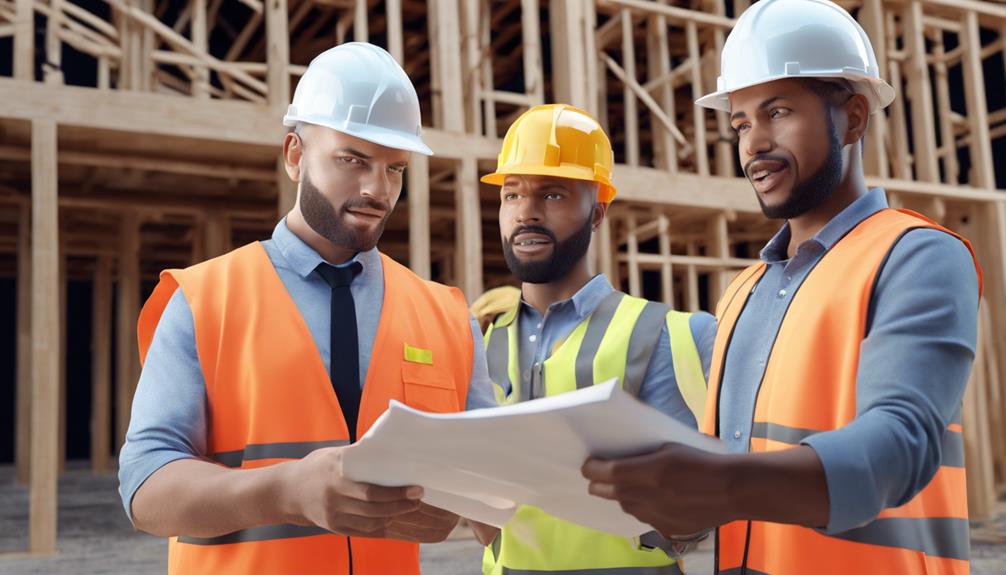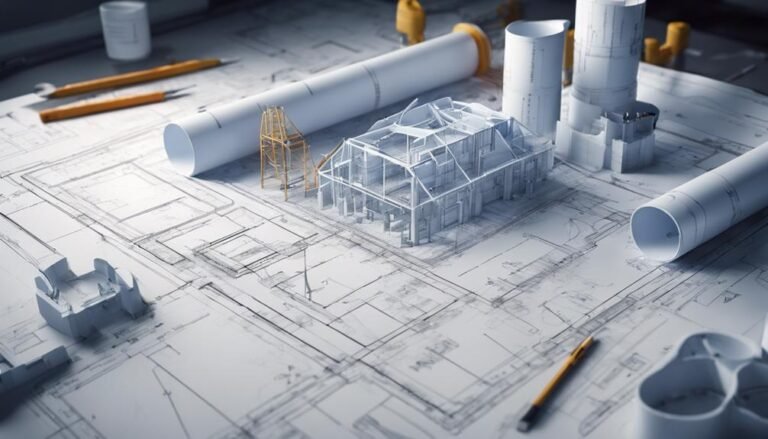Effective Communication Skills for Construction Managers"
Effective communication skills are essential for construction managers. These skills aid in coordinating projects efficiently and ensuring team alignment on objectives. By fostering open communication channels, you promote a cohesive work environment, critical for avoiding misunderstandings and delays. Essential messaging strategies involve conveying complex information clearly and concisely. Active listening techniques help understand team members and clients, enhancing collaboration and problem-solving. Tailoring communication to stakeholders ensures clarity and relationship building. Conflict resolution strategies, like mediation and negotiation skills, are key for handling disputes effectively. Building trust through transparency and technology tools is crucial. Improving these skills benefits project success and team dynamics.
Key Takeaways
- Clear and concise messaging
- Active listening techniques
- Tailoring communication to stakeholders
- Conflict resolution strategies
- Building trust and rapport
Importance of Communication Skills
Effective communication skills are essential for construction managers to successfully coordinate projects and guarantee efficient completion. Communication effectiveness lies at the core of your role in ensuring that all team members are on the same page regarding project objectives, timelines, and tasks. As a construction manager, your ability to convey information clearly and accurately to your team is critical for avoiding misunderstandings and delays.
Team collaboration is another key aspect where strong communication skills play an important role. By fostering open communication channels, you can encourage collaboration among team members, subcontractors, and stakeholders. Clear and effective communication promotes a cohesive work environment where everyone understands their responsibilities and can work together towards common goals.
Clear and Concise Messaging
In order to guarantee seamless project execution, construction managers must craft messages that are both clear and succinct. Effective communication is vital in the construction industry, where complex information needs to be conveyed accurately to various stakeholders. Clear and concise messaging ensures that instructions are understood correctly, minimizing errors and rework.
To achieve effective communication, construction managers should use simple language that's easily understood by all parties involved. Avoiding jargon and technical terms unless necessary can help prevent confusion and misinterpretation. Additionally, organizing information in a logical manner and focusing on the key points can enhance the clarity of the message.
Concise messaging is equally important as it keeps the communication focused and to the point. Construction managers should aim to convey information efficiently without unnecessary details or lengthy explanations. Being concise helps in maintaining the recipients' attention and ensures that the message is delivered quickly and effectively.
Active Listening Techniques
Crafting clear and concise messages sets the foundation for effective communication in construction management, and now let's explore Active Listening Techniques. Active listening techniques are crucial for construction managers to guarantee they understand their team members, clients, and other stakeholders. This involves giving full attention to the speaker, acknowledging the message, and providing appropriate feedback.
Effective feedback strategies, such as paraphrasing what was said and asking clarifying questions, demonstrate active listening and help prevent misunderstandings. By actively listening, construction managers can foster stronger relationships, build trust, and enhance collaboration within their teams. Additionally, active listening can lead to improved problem-solving and decision-making processes by gathering all relevant information.
Incorporating these techniques into daily interactions can greatly improve communication effectiveness on construction sites and in project management meetings. Remember, active listening isn't just about hearing words but truly understanding the message being conveyed.
Tailoring Communication to Stakeholders
When tailoring communication to stakeholders in construction management, consider their specific needs and preferences to guarantee effective engagement and understanding. Stakeholder engagement is vital for the success of construction projects, and employing suitable communication strategies is key. Here are some essential points to keep in mind:
- Identify Key Stakeholders: Determine who the primary stakeholders are and prioritize communication with them.
- Adapt Communication Styles: Tailor your communication approach based on the stakeholder's preferences and level of understanding.
- Provide Timely Updates: Keep stakeholders informed about project progress, milestones, and any relevant changes.
- Encourage Feedback: Create opportunities for stakeholders to share their thoughts, concerns, and suggestions.
- Clarify Expectations: Ensure that stakeholders have a clear understanding of their roles, responsibilities, and the project objectives.
Conflict Resolution Strategies
When resolving conflicts in construction management, you should focus on mediation techniques to facilitate discussions between parties.
Enhancing your negotiation skills is essential for managing disputes effectively and reaching mutually beneficial agreements.
Mediation Techniques for Conflicts
Utilizing effective mediation techniques is essential for construction managers to successfully navigate conflicts within their teams and projects. When faced with disputes, your skills in conflict resolution and understanding team dynamics play a vital role. Here are five mediation techniques and strategies to help you effectively manage conflicts:
- Active Listening: Focus on understanding the concerns of all parties involved.
- Neutral Position: Maintain impartiality and avoid taking sides during mediation.
- Clarifying Expectations: Clearly define roles, responsibilities, and objectives to minimize misunderstandings.
- Brainstorming Solutions: Encourage open discussions to explore various options for resolution.
- Setting Agreements: Make sure that agreements reached are documented and understood by all parties involved.
Negotiation Skills in Disputes
To effectively resolve conflicts in construction management, honing strong negotiation skills is paramount for addressing disputes and reaching mutually beneficial agreements.
Negotiation tactics play a vital role in conflict management and dispute resolution within construction projects. Construction managers must be adept at employing various negotiation strategies to navigate disagreements effectively.
Understanding the interests of all parties involved, actively listening to concerns, and proposing creative solutions are essential components of successful negotiation. By fostering an atmosphere of collaboration and open communication, construction managers can facilitate the resolution of disputes in a constructive manner.
Utilizing principled negotiation techniques, such as focusing on interests rather than positions and exploring multiple options for mutual gain, can lead to sustainable agreements that satisfy all stakeholders involved.
Nonverbal Communication Cues
When managing a construction team, understanding nonverbal cues is essential. Body language and eye contact play significant roles in effective communication.
Paying attention to these cues can help you better navigate interactions and lead your team successfully.
Body Language Importance
Effective construction managers understand that mastering nonverbal communication cues, such as body language, is essential for successful project coordination and team dynamics. Being aware of your posture and understanding how gestures impact interactions are key elements in effective communication within construction management.
Here are five key points to keep in mind:
- Open Body Language: Make sure your gestures and posture are open and welcoming.
- Confidence: Project confidence through upright posture and assertive gestures.
- Eye Contact: Maintain appropriate eye contact to convey attentiveness and interest.
- Mirroring: Use mirroring techniques to build rapport with team members.
- Consistency: Ensure your body language aligns with your verbal communication to avoid mixed messages.
Eye Contact Significance
Understanding the significance of eye contact in nonverbal communication cues is essential for effective interactions in construction management. Eye contact is a powerful form of nonverbal communication that can convey confidence, attentiveness, and respect.
When engaging in interpersonal interactions, maintaining appropriate eye contact can help establish trust and rapport with your team members, clients, and stakeholders. It shows that you're actively listening and engaged in the conversation.
On the other hand, avoiding eye contact may signal disinterest, lack of confidence, or even dishonesty. By being mindful of your eye contact and using it appropriately, you can enhance your communication skills, strengthen relationships, and foster a positive work environment in construction management.
Technology Tools for Better Communication
Incorporating technology tools can greatly enhance communication efficiency and effectiveness for construction managers. Utilizing virtual meetings allows for real-time discussions with team members regardless of their physical location. Mobile apps provide instant access to project updates, schedules, and communication channels on-the-go.
Additionally, project management software centralizes information, making it easily accessible to all team members. Cloud storage solutions enable seamless sharing of large files and documents among stakeholders. Finally, using communication platforms with chat features facilitates quick decision-making and problem-solving.
- Virtual meetings: Enable real-time discussions.
- Mobile apps: Provide on-the-go access to project updates.
- Project management software: Centralizes project information.
- Cloud storage solutions: Facilitate easy sharing of large files.
- Communication platforms with chat features: Enhance quick decision-making.
Building Trust and Rapport
When managing construction projects, remember that trust is built through transparency. Your team members will appreciate your honesty and openness, leading to stronger relationships and smoother collaboration.
Trust Through Transparency
To establish trust and rapport in construction management, transparency is key in fostering strong working relationships with your team and stakeholders. Transparency builds trustworthiness, enhances credibility, and guarantees clarity in project expectations. Open communication strategies facilitate a better understanding of project goals and challenges, leading to more effective problem-solving and decision-making processes.
Personal Connections Matter
Establishing personal connections is vital for construction managers in building trust and rapport with their team and stakeholders. Building relationships within the construction industry is essential for fostering collaboration and ensuring smooth project execution.
By taking the time to connect with your team members on a personal level, you can create a more cohesive and motivated workforce. Networking opportunities also play a significant role in expanding your professional circle, opening doors to new partnerships and potential clients.
Attending industry events, engaging in online construction communities, and participating in local construction associations are effective ways to enhance your network. Remember, personal connections not only improve communication but also contribute to a positive work environment and successful project outcomes.
Consistent Communication Builds
Building trust and rapport with your team and stakeholders hinges on maintaining consistent communication in construction management. Consistent feedback and team collaboration are key elements in fostering strong relationships within the construction industry. Here are five essential strategies to help you build trust and rapport effectively:
- Schedule regular check-ins to provide updates and gather feedback.
- Encourage open and honest communication to address any concerns promptly.
- Share project milestones and achievements to keep the team motivated.
- Involve team members in decision-making processes to promote collaboration.
- Seek input from stakeholders to guarantee their needs and expectations are met.
Feedback and Performance Evaluation
Improving feedback mechanisms and performance evaluations can greatly enhance the effectiveness of communication within construction management teams. Feedback delivery plays an important role in fostering performance improvement. Constructive criticism, when delivered effectively, can provide valuable insights for growth. It's essential to focus on specific behaviors or actions that need improvement rather than generalizing feedback. This approach helps in setting clear goals for individuals or teams to work towards.
Performance evaluations shouldn't only highlight areas needing improvement but also acknowledge achievements and strengths. Balancing constructive feedback with positive reinforcement is key to maintaining motivation and morale within the team. Setting SMART (Specific, Measurable, Achievable, Relevant, Time-bound) goals during performance evaluations can provide a clear roadmap for progress. These goals should be aligned with the overall objectives of the project and the organization.
Regular feedback sessions and performance evaluations promote continuous learning and development, contributing to the overall success of construction projects.
Continuous Improvement in Communication
To enhance communication effectiveness within construction management teams, a focus on continuous refinement and enhancement of communication strategies is imperative. In the dynamic environment of construction projects, constant improvement in communication is key to success.
Here are some strategies to help you achieve continuous improvement in communication:
- Establish a Feedback Loop: Encourage open and honest feedback from team members to identify communication strengths and areas needing improvement.
- Offer Communication Workshops: Provide regular training sessions or workshops to enhance communication skills and address any gaps in understanding.
- Utilize Technology Tools: Explore communication tools and software that can streamline information sharing and collaboration within the team.
- Regular Team Meetings: Schedule frequent team meetings to discuss project updates, clarify expectations, and address any communication challenges.
- Celebrate Communication Successes: Acknowledge and celebrate instances of effective communication within the team to reinforce positive communication behaviors.
Conclusion
To sum up, effective communication skills are crucial for construction managers to successfully navigate various stakeholders and projects.
Are you prepared to enhance your communication abilities to improve project outcomes and build stronger relationships within your team?
By employing clear messaging, active listening, and conflict resolution strategies, you can elevate your leadership capabilities and drive success in the construction industry.
Keep refining your communication skills to guarantee continued growth and success in your role as a construction manager.







